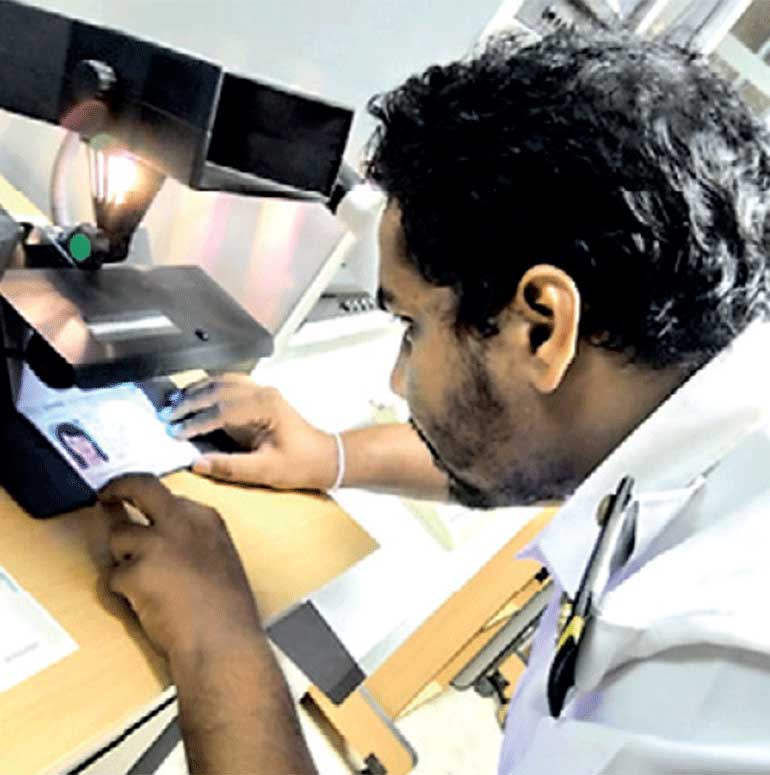Thursday Feb 19, 2026
Thursday Feb 19, 2026
Monday, 12 September 2022 03:29 - - {{hitsCtrl.values.hits}}

By Charumini de Silva
 Sri Lanka has issued over 700,000 passports during the first eight months, creating an all-time high of travel documents issued by the Immigration and Emigration Department.
Sri Lanka has issued over 700,000 passports during the first eight months, creating an all-time high of travel documents issued by the Immigration and Emigration Department.
As per the department's history, the highest number of passports issued was in 2016, at 658,725 for the entire year. The output of 2022 is likely to renew the current record once again.
The latest data from the Immigration and Emigration Department shows that passport issuance in the first eight months of the year has increased sharply by 312% to 705,412 from 171,168 passports in the same period last year.
“We received a total of 116,244 applications for both one-day and normal service passports in August, and of it, only 115,152 were issued during the month,” Immigration and Emigration Department Deputy Controller and Media Spokesperson Piyumi Bandara told the Daily FT yesterday.
The August passport issuance outcome is also a significant surge of 297% compared to 28,976 passports issued in the same period a year earlier.
The first eight months of data of 2022 clearly indicate that the race to migrate has intensified amidst the ongoing economic crisis.
As per the data, over 88,170 passports were issued monthly during the first eight months of 2022.
In January 52,278, February 55,381, March 74,890, April 53,151, May 52,945, June 122,491, and July 98,124 passports were issued. June recorded the highest outcome of passports issued in any month during the year.
The pent-up demand for passports has seen a significant uptick from the latter part of 2021 with the ongoing economic crisis and multiple other challenges faced by the public on a daily basis.
“At present, the department receives over 4,000 appointments daily,” she added.
Given the recent long queues and a backlog of applications, the department decentralised its one-day passport service to Kandy, Matara, and Vavuniya regional offices in early July 2021.
In the beginning, the decentralised one-day passport issuance service will be given to only 100 applicants who have already reserved an appointment and time at the specific regional offices.
She also said the Department has requested the Public Administration Home Affairs, Provincial Councils, and Local Government Ministry to extend more manpower to meet the pent-up demand.
The new request was made despite the recently introduced two separate work shifts in place. The department staff begins the first shift from 7 a.m. to 2 p.m. and the second shift from 2 p.m. to 10 p.m. Overcapacity has exhausted the staff, as the department has stepped up its daily issuance of passports from 2,000 to 3,500 at present.
The Immigration and Emigration department has been in the media spotlight, as thousands of people who visit its head office in Battaramulla have faced multiple problems and undue delays in services over the last couple of months.
Sri Lanka’s demand for foreign employment has increased significantly over the past few months, as the hardships faced by all walks of life are escalating by the day.
The latest external sector performance report by the Central Bank shows 163,522 people have gone abroad for employment in the first seven months of the year compared to 37,041 in the corresponding period of the previous year, whilst only 117,952 people had left for employment opportunities overseas for the entirety of 2021.
Total departures for foreign employment were recorded at 22,821 in July and comprised unskilled (8,232), skilled (7,091), and domestic aid (4,479) categories.
The Sri Lanka Bureau of Foreign Employment (SLBFE) confirmed that a total of 208,772 individuals have left to take up employment overseas during the first eight months of 2022.
The Bureau said the number of people leaving overseas for employment is steadily increasing.
Among those who left the country for jobs in other countries so far include over 126,000 were males.
Labour and Foreign Employment Minister Manusha Nanayakkara said yesterday the target for 2022 was sending 300,000 workers for foreign jobs and it has been increased to 330,000 due to high demand, both on the part of job seekers and the labour receiving countries.
The Government is hoping to send at least 5,000 people by the end of the year to take up employment in South Korea, whilst noting that a total of 2,858 individuals have already left for South Korea for jobs this year.
